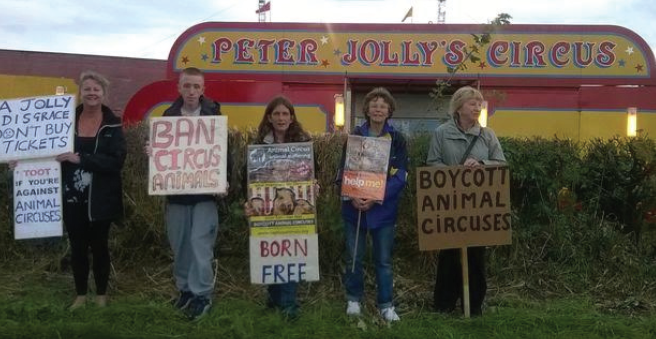
ANIMAL DEFENDERS INTERNATIONAL (ADI) have called for Borth residents to boycott Peter Jolly’s Circus whilst it is in Ceredigion this month, as the circus is one of two remaining circuses that still feature wild animal acts. This is an outdated and barbaric practice that leads to suffering and is overwhelmingly opposed by the public.
Jan Creamer, President of Animal Defenders International, said: “Animal Defenders International has repeatedly documented the suffering and abuse of wild animals in circuses. Circuses simply cannot meet the needs of wild animals in small, mobile accommodation. The government has promised a ban, but we’re asking people to vote with their feet – don’t go to a circus with animals.”
Many local authorities have already opted to ban the use of animals in circuses and the government has promised a nationwide ban.
Due to the constant state of travel and their temporary nature, circuses cannot provide animals with adequate facilities to keep them physically or psychologically healthy and evidence of the suffering endured by animals in circuses is well documented and scientifically established, proving that their well-being is always compromised.
ADI’s observations of Peter Jolly’s Circus at their winter quarters over the past year have shown that even when off the road, animals were confined inside barns in small pens. Some animals remained inside a crowded barn for more than 14 hours a day and on one occasion, for a continuous 40-hour period.
During extensive observations carried out by ADI using hidden cameras, show animals at Peter Jolly’s Circus in Shropshire all huddled in tiny spaces with no movement, and zebras, ponies, donkeys and camels are all kept together with bullying rife. The animals are tethered for at least 16 hours of the day while domesticated species such as goats are confined with a tiny concrete cell, only leaving the confines once during observation.
The minimum requirement of space for a wild animal, according to Defra, is just four metres by five metres; yet, ADI claim Jolly’s did not even provide this.
So far, 32 countries around the world have prohibited the use of animals in circuses, with England and Wales promising to ban wild animal acts.
The Federation of Veterinarians of Europe (FVE) concluded: “There is by no means the possibility that their [wild mammals in travelling circuses] physiological, mental and social requirements can adequately be met.”
The British Veterinary Association adds: “The welfare needs of non-domesticated, wild animals cannot be met in a travelling circus – in terms of housing or being able to express normal behaviour.”
As well as vets, the continued use of wild animals in circuses is widely opposed by animal welfare experts, animal protection groups, politicians and a huge majority of the public. In response to a consultation by Defra on the issue, 94.5% of respondents supported a ban.
Over 200 local authorities in the UK have prohibited wild or all animal acts on public land and opinion polls consistently show that the public remains overwhelmingly opposed to wild animal acts, with a high proportion against all animal acts.
Despite assurances from the circus industry that animals are well cared for, the physical and psychological health of animals in circuses is inevitably compromised. Animals in circuses can also be subjected to brutal training methods and violence – wherever ADI has conducted an undercover investigation in the UK and around the world, it has documented acts of abuse.
Animal circuses do nothing to teach people about the animals’ real needs and the way they live, and have no role to play in education or conservation.
















Add Comment